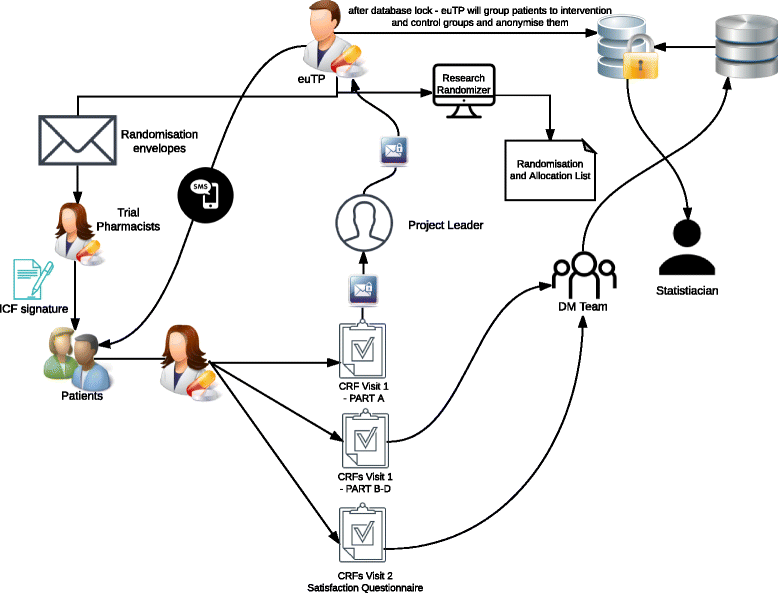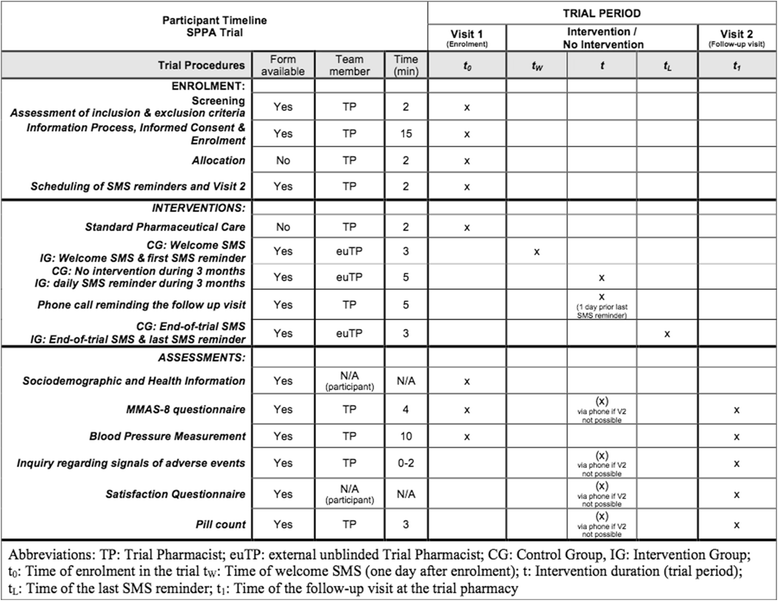The effectiveness of daily SMS reminders in pharmaceutical care of older adults on improving patients' adherence to antihypertensive medication (SPPA): study protocol for a randomized controlled trial
- PMID: 28720121
- PMCID: PMC5516377
- DOI: 10.1186/s13063-017-2063-8
The effectiveness of daily SMS reminders in pharmaceutical care of older adults on improving patients' adherence to antihypertensive medication (SPPA): study protocol for a randomized controlled trial
Abstract
Background: Despite a variety of efficient and cost-effective antihypertensive medication, hypertension remains a serious health and economic burden. High consumption of cardiovascular drugs in the Slovak Republic does result neither in better hypertension control nor in significant decrease in cardiovascular mortality. At the same time, Slovakia has alarmingly low patients' adherence to medication intake. Studies have shown the efficiency of short messaging service (SMS) reminders to improve patients' adherence and health outcomes at low costs. Since SMS is popular among Slovaks, this approach may be feasible also in Slovakia. The primary objective is to assess if daily SMS reminders of antihypertensive medication intake provided by pharmacists in addition to the standard pharmaceutical care increase the proportion of adherent older hypertensive ambulatory patients.
Methods: The SPPA trial is a pragmatic randomized parallel group (1:1) trial in 300 older hypertensive patients carried out in community pharmacies in Slovakia. Trial pharmacies will be selected from all main regions of Slovakia. Trial intervention comprises daily personalized SMS reminders of medication intake embedded into usual pharmaceutical practice. The primary outcome is a combined adherence endpoint consisting of subjective self-reported medication adherence via the eight-item Morisky Medication Adherence Scale (MMAS-8) and objective pill count rate. Secondary outcomes include: change in the MMAS-8; comparison of adherence rates using pill count; change in systolic blood pressure; and patient satisfaction. Also, direct treatment costs will be evaluated and a cost-effectiveness analysis will be carried out.
Discussion: The SPPA trial engages community pharmacists and mobile health (mHealth) technologies via evidence-based pharmaceutical care to efficiently and cost-effectively addresses current main healthcare challenges: high prevalence of hypertension; overconsumption of cardiovascular medicines; low adherence to medication treatment; and resulting uncontrolled blood pressure. The results may identify new possibilities and capacities in healthcare with low additional costs and high value to patients.
Trial registration: ClinicalTrials.gov, NCT03105687 . Registered on 07 March 2017.
Keywords: Adherence; Antihypertensive drugs; Cost-effectiveness; Pharmacists; SMS reminders; mHealth.
Conflict of interest statement
Authors’ information
ZH is a Doctor of Pharmacy (PharmD) specialized in clinical trial design conduct and coordination. Currently a PhD candidate of Clinical Pharmacy at the Faculty of Pharmacy, Comenius University in Bratislava. MS is a Doctor of Pharmacy (PharmD, cum laude) specialized in clinical trials monitoring and management. MH is a research expert at the Institute for child psychology and pathopsychology, where he specializes in psychometrics, statistical analysis and modeling. TT is an Associate Professor of Social Pharmacy focusing on Health Technology Assessment, Pharmacoeconomics and Outcome research. Currently the Head of the Department of Organization and Management of Pharmacy at the Faculty of Pharmacy, Comenius University in Bratislava. MK is a Professor of Pharmacology at the Faculty of Pharmacy, Comenius University in Bratislava. She is the Head of the Section of Clinical pharmacology and pharmacotherapy at the Department of Pharmacology and Toxicology at the Faculty of Pharmacy, Comenius University in Bratislava and the guarantee of the PhD study program in Clinical pharmacy. DM is a Professor at the Department of Community Health Sciences, UCLA Fielding School of Public Health. Internationally distinguished expert with profound expertise and experience in planning and evaluation of patient- and community-based health education programs; international health; adherence to medical recommendations; STI/HIVAIDS prevention; hypertension, diabetes, and tuberculosis control.
Ethics approval and consent to participate
Ethics Committee for biomedical research, Faculty of Pharmacy, Comenius University in Bratislava approved the SPPA trial protocol, all trial forms and Informed Consent Form (Multicenter Ethics Committee statement 01/2017). All substantial amendments to the trial protocol or other relevant trial materials will be submitted to the Ethics Committee for biomedical research, Faculty of Pharmacy, Comenius University in Bratislava for approval prior to their implementation in the trial. The Informed Consent Form comprises all information on the study and was prepared in accordance with the WHO international requirements and national legislation. Written informed consent will be obtained from each patient prior to his or her participation in the SPPA trial.
Consent for publication
Not applicable.
Competing interests
The authors declare that they have no competing interests.
Publisher’s Note
Springer Nature remains neutral with regard to jurisdictional claims in published maps and institutional affiliations.
Figures


Similar articles
-
The (cost-)effectiveness of a patient-tailored intervention programme to enhance adherence to antihypertensive medication in community pharmacies: study protocol of a randomised controlled trial.Trials. 2017 Jan 19;18(1):29. doi: 10.1186/s13063-016-1696-3. Trials. 2017. PMID: 28103948 Free PMC article. Clinical Trial.
-
Empowering pharmacists in asthma management through interactive SMS (EmPhAsIS): study protocol for a randomized controlled trial.Trials. 2014 Dec 13;15:488. doi: 10.1186/1745-6215-15-488. Trials. 2014. PMID: 25494702 Free PMC article. Clinical Trial.
-
A randomized controlled behavioral intervention trial to improve medication adherence in adult stroke patients with prescription tailored Short Messaging Service (SMS)-SMS4Stroke study.BMC Neurol. 2015 Oct 21;15:212. doi: 10.1186/s12883-015-0471-5. BMC Neurol. 2015. PMID: 26486857 Free PMC article. Clinical Trial.
-
Digital Health Interventions to Enhance Tuberculosis Treatment Adherence: Scoping Review.JMIR Mhealth Uhealth. 2023 Dec 4;11:e49741. doi: 10.2196/49741. JMIR Mhealth Uhealth. 2023. PMID: 38054471 Free PMC article.
-
Cost and cost-effectiveness of digital technologies for support of tuberculosis treatment adherence: a systematic review.BMJ Glob Health. 2024 Oct 30;9(10):e015654. doi: 10.1136/bmjgh-2024-015654. BMJ Glob Health. 2024. PMID: 39477335 Free PMC article.
Cited by
-
Yoga intervention and reminder e-mails for reducing cancer-related fatigue - a study protocol of a randomized controlled trial.BMC Psychol. 2019 Sep 18;7(1):64. doi: 10.1186/s40359-019-0339-3. BMC Psychol. 2019. PMID: 31533823 Free PMC article. Clinical Trial.
-
Interventions for improving medication-taking ability and adherence in older adults prescribed multiple medications.Cochrane Database Syst Rev. 2020 May 8;5(5):CD012419. doi: 10.1002/14651858.CD012419.pub2. Cochrane Database Syst Rev. 2020. PMID: 32383493 Free PMC article.
-
How Behavior Change Strategies are Used to Design Digital Interventions to Improve Medication Adherence and Blood Pressure Among Patients With Hypertension: Systematic Review.J Med Internet Res. 2020 Apr 9;22(4):e17201. doi: 10.2196/17201. J Med Internet Res. 2020. PMID: 32271148 Free PMC article.
-
Mobile phone text messaging for medication adherence in secondary prevention of cardiovascular disease.Cochrane Database Syst Rev. 2024 Mar 27;3(3):CD011851. doi: 10.1002/14651858.CD011851.pub3. Cochrane Database Syst Rev. 2024. PMID: 38533994 Free PMC article.
-
Key Elements and Theoretical Foundations for the Design and Delivery of Text Messages to Boost Medication Adherence in Patients With Diabetes, Hypertension, and Hyperlipidemia: Scoping Review.J Med Internet Res. 2025 Jul 21;27:e71982. doi: 10.2196/71982. J Med Internet Res. 2025. PMID: 40690759 Free PMC article.
References
-
- World Health Organization . Global Health Estimates 2015: Deaths by Cause, Age, Sex, by Country and by Region, 2000–2015. Geneva: WHO; 2016.
-
- Demographic Research Centre INFOSTAT. Priciniy smrti: oblasti a kraje [Causes of death: areas and regions], Bratislava. 2017. http://www.infostat.sk/vdc/sk/index.php?option=com_wrapper&view=wrapper&.... Accessed 27 Jan 2017.
-
- Piepoli MF, Hoes AW, Agewall S, Albus C, Brotons C, Catapano AL, et al. 2016 European Guidelines on cardiovascular disease prevention in clinical practice: The Sixth Joint Task Force of the European Society of Cardiology and Other Societies on Cardiovascular Disease Prevention in Clinical Practice (constituted by representatives of 10 societies and by invited experts): Developed with the special contribution of the European Association for Cardiovascular Prevention & Rehabilitation (EACPR) Eur J Prev Cardiol. 2016;23:NP1–96. doi: 10.1177/2047487316653709. - DOI - PubMed
-
- Mancia G, Fagard R, Narkiewicz K, Redán J, Zanchetti A, Böhm M, et al. Practice guidelines for the management of arterial hypertension of the European Society of Hypertension (ESH) and the European Society of Cardiology (ESC): ESH/ESC Task Force for the Management of Arterial Hypertension. J Hypertens. 2013;2013(31):1925–38. doi: 10.1097/HJH.0b013e328364ca4c. - DOI - PubMed
-
- Avdicova M, Francisciova K, Datelova M. Monitorovanie rizikových faktorov chronických chorôb v SR [Monitoring of risk factors of chronic diseases in the Slovak Republic]. ed. Banska Bystrica, Slovakia: Regionálny úrad verejného zdravotníctva so sídlom v Banskej Bystrici za podpory Svetovej zdravotníckej organizácie–regionálnej úradovne v Kodani [Regional Office of Public Health in Banska Bystrica with the support of WHO Regional Office in Copenhagen]; 2012.
Publication types
MeSH terms
Substances
Associated data
LinkOut - more resources
Full Text Sources
Other Literature Sources
Medical

